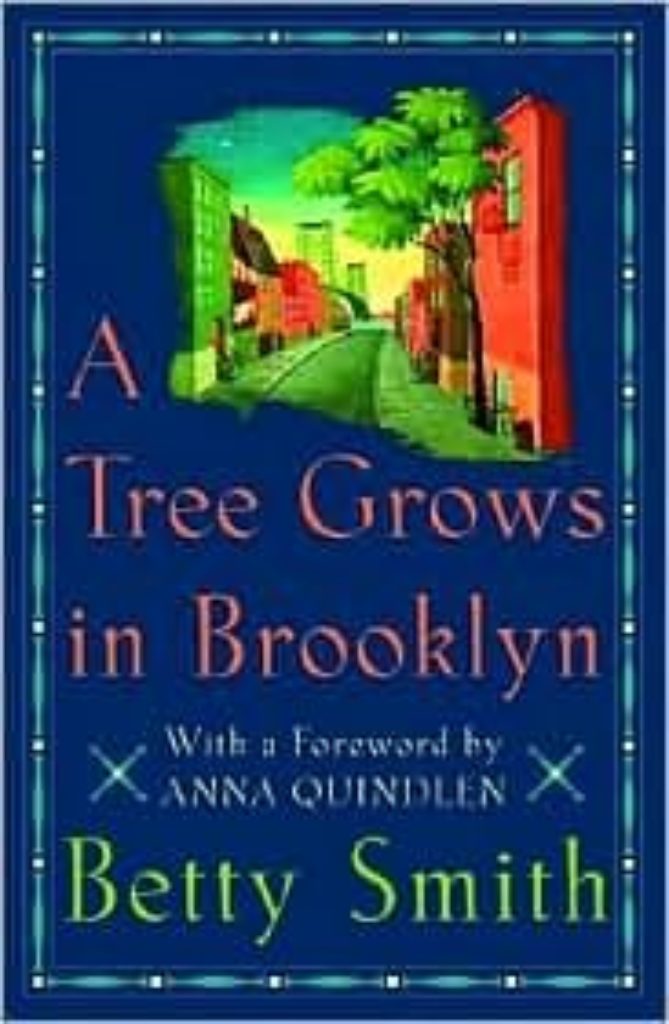A Tree Grows in Brooklyn by Betty Smith has been reviewed by Focus on the Family’s marriage and parenting magazine.

A Tree Grows in Brooklyn by Betty Smith has been reviewed by Focus on the Family’s marriage and parenting magazine.
From her fire escape, shaded by a tree growing through the sidewalk below, Francie Nolan observes and writes about Brooklyn in the early 1900s. Readers walk with Francie through her impoverished childhood and develop an intimate knowledge of the colorful characters and scenes that contribute to her early experiences. Johnny, Francie’s singing waiter father, loves to dream; her mother Katie, by contrast, serves as the family’s pillar of strength, practicality and security. As Francie grows, she overcomes adversity and thrives by incorporating attributes of both parents.
In Francie’s community, obvious animosity exists between Catholics and Jews. Francie’s people are Catholic; most go to Mass out of habit or to be absolved of the things they did the night before. Katie enlists God’s help when she’s pregnant and desperate, explaining to Him that she needs Him when she’s “not the boss of her own mind and body,” but she doesn’t need Him otherwise. Francie questions her belief in God related to her father’s death but indicates at the end of the story that she’s gotten to know God better.
Katie’s “intensely religious” Catholic mother also believes in ghosts and fairies. The author talks about the qualities that “God or whatever is his equivalent” puts in each soul. Katie becomes pregnant while Francie is still small and sickly; she condemns the comments of some neighbors who say it would be better if Francie died or that Katie should “get rid of” the baby inside of her. The story’s strong feminist theme is also illustrated in quotes like this one: While hearing Katie scream during childbirth, a neighbor lady says, “Men have all the fun, and women have all the pain.” Most of the male characters appear thoughtless or clueless, and the story’s women demonstrate strength and resilience in the face of hardship.
Although Johnny is a proud, jovial father, he rarely works, often comes home drunk and demonstrates little responsibility for his family’s welfare. To compensate, Katie works tirelessly to make a better life for her kids; the author tells us Katie has traded tenderness for capability and survival. She believes education will rescue her children from their plight, so she saves every penny she can scrape together for their schooling and has the kids read a page from the Bible and from a work of Shakespeare each night. Unlike other neighborhood parents mentioned, she discusses sex and body changes frankly with her children. Katie’s mother believes her husband is literally the Devil.
The Brooklyn folks do their share of cursing, using the Lord’s name in vain and words such as b–tard, b–ch, h— and a–. The author comments that to these “inarticulate people with small vocabularies,” sometimes cursing was really the same as saying, “God bless you.” Descriptive language also appears when a mother weans her son by drawing a scary face on her breast. A neighborhood pervert attacks Francie in the hallway of her building, touching her with his private parts before Katie shoots and kills him. Also, the married women of the neighborhood stone a single mother.
As Francie and children her age start becoming interested in sex, the author says parents in the neighborhood don’t know how to answer their kids’ questions. They have simply made up their own names for things within their marriages. Sissy, Francie’s promiscuous aunt, comforts Johnny in a “maternal” way by offering him alcohol and letting him sleep on her bare breasts. Sissy is also a bigamist, having been married a number of times without getting a proper divorce because it’s forbidden in the Catholic Church. Francie, at 16, considers going to a motel with a soldier she loves, who is 22, but she doesn’t. Later, she and her mother regret that decision. Her mother believes that Francie will never have those feelings for anyone else.
Get free discussion questions for this book and others, at FocusOnTheFamily.com/discuss-books.
Book reviews cover the content, themes and world-views of fiction books, not their literary merit, and equip parents to decide whether a book is appropriate for their children. A book’s inclusion does not constitute an endorsement by Focus on the Family.
You can request a review of a title you can’t find at [email protected].